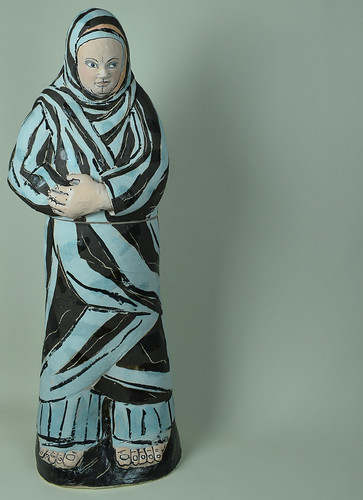Katheryn Corbin: Migrant
Opening reception: Sunday, February 25, 3-5 pm
FREE
Birding with Katheryn Corbin & Poet Chuck Stebelton, Sunday, April 29, 2018, 8:30-10 am
Free to members or with admission.
Artist's tour of the sculpture garden: Sunday, May 13, 2018, 3 pm
Free to members or with admission.
Katheryn Corbin makes work that responds to the climate: physical, cultural, political. In this exhibition, she shows a series of nearly-life-sized figurative ceramic sculptures, as well as sawdust-fired vessels made during a residency at Lynden.
During her residency, which began in June 2016, Katheryn Corbin began to connect the migration of the birds and butterflies she saw at Lynden with news of the worsening international refugee crisis. While much of her time at Lynden was spent making vessels that she fired by burying them in sawdust in a trash can out on Lynden’s grounds (a 24-hour process that provided plenty of time for observing the landscape and its inhabitants), she also used the studio to make ceramic sculptures. Corbin began making full-length ceramic figures in 2006, and she has returned to the practice sporadically since then. The hollow figures are made in two, and sometimes three, parts, so they can be fired separately in the kiln. After firing, Corbin paints the surfaces. Her earlier figures use dark line to define the pale, almost monochromatic forms. In early 2017 she made two migrant figures at Lynden, one carrying a child on her back, and used their surfaces to explore pattern and color.
Nine painted figurative sculptures fill Lynden’s gallery, arranged in tableaux. Corbin views these sculptures as actors in dramas, and she contextualizes them with props: pots, a small watercolor, skirts, a folding window. Drawing on her interest in the movement of butterflies and a photograph of a performance she saw in a newspaper, Corbin created “Chasing Butterflies,” a vignette of two half-figures with tulle skirts and a small, Pierrot-like boy stationed among butterflies and flowers. This interest in movement and migration recurs just outside the gallery, where a digital print, an enlargement of a watercolor of a dead bird, hangs; she has also included a large painting of Japanese magnolia blossoms in the front entrance, a nod to the tree not far beyond Lynden’s patio.
Several of Corbin’s sawdust-fired pots are dotted across the gallery. Two large vessels have found their way into the dining room, where they share space, and an interest in organic forms, with Isamu Noguchi’s Sinai.
It is not unusual for the natural world to make its way into work produced during and after a Lynden residency, but as Corbin’s exhibition illustrates, time spent at Lynden by artists-in-residence can impact work in unexpected ways. For Corbin, the opportunity to devote time to thinking led to new ways of connecting ideas and approaching an established practice. She began her residency on the functional side of her ceramic practice, with the goal of investigating the chance processes of sawdust firing in conjunction with other forms of surface embellishment, such as painting and drawing. The timeframe—more than a year—created opportunities for her to expand her project, to explore different mediums (she made paintings, drawings, sculpture, and photographs in addition to the pots), to respond in a timely way to the world she was living in—both at Lynden and at large--and to discover new links between her functional and sculptural practices.
About the Artist
Katheryn Corbin spent her childhood in Detroit, Michigan, and her adult years in Illinois and Wisconsin. She received her MFA in Ceramics from University of Wisconsin-Milwaukee, and her BA in Art and English from Augustana College in Rock Island, Illinois. Her ceramic work, which includes functional and sculptural approaches to clay, has been exhibited in galleries and markets on the East Coast, in the South, and throughout the midwest. Her figures, both on the wall and life size, are in the collection on the campuses of Epic Systems in Verona, Wisconsin, as well as in numerous private collections. Corbin has taught in both public and private museums, schools, and universities, and teaches ceramics workshops at Lynden.

